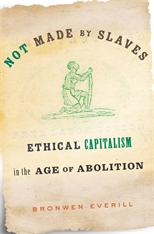The Book
Not Made by Slaves: Ethical Capitalism in the Age of Abolition
The Author(s)
Bronwen Everill

Those familiar with the concept of “Fair Trade Coffee”, i.e. buying this product from sources that adhere to certain standards of production, will grasp the related notion inscribed on a sugar bowl of the 19th century: “East India Sugar Not Made by Slaves.”
In this brisk jaunt through decades of history, the point is made that “consumer boycotts and [the] free produce movement have made their way into popular memory of the abolition movements, particularly as it becomes clear that the transatlantic abolition movements helped to create so many of the social justice campaign ideas used to this day. Fair trade didn’t just spring out of nowhere” [244]. Still, the author suggests that relying on consumer self-interest and proclivities carry severe limitations in transforming global capitalism—then and now.
This is a book that intervenes masterfully in various fields—not just the obvious: slavery and abolition—but, as well, this work can be read profitably alongside the burgeoning scholarship that seeks to understand the rise and evolution of capitalism itself. As she must, she invokes the pathbreaking work of Joseph Inikori in sketching the impact of how enslaved labor powered the Industrial Revolution. Reflecting the latest scholarly departure, the author argues that “capitalism and slavery were not incompatible” [15]. This insight allows the author to examine such phenomena as slave mortgages and slaves as instruments of credit and debt, all of which turbocharged capitalism. “Slaves,” writes the author, “were an important part of finance capitalism not only for their labor power but also for their function as a form of property that could act as a store of value or a form of collateral” [112].
And, not unlike the “Fair Trade” movement of today, “ethical capitalism,” according to Everill, was “not…a campaign against capitalism but was a campaign to reform capitalism” [175].
Thus, these reformers argued that “free labor” or non-slave labor was superior to its bonded counterpart since “at least free laborers could be consumers in their own right,” providing jet propulsion to capitalism itself [195]. However, the author is skeptical of other arguments denigrating slave labor in comparison to its “free” counterpart. “The argument that slavery produced inefficient work by poorly incentivizing enslaved laborers was a constant, though questionable, refrain” [227].
As with organized abolition itself, the attempt to impose a more humane ethos on the inherently inhumane realm of slave production, has its roots in late 18th century Britain. Thus, a focus of this enlightening book examines the often intertwined experiences of traders in Senegambia, Sierra Leone and Liberia—the latter two opening the door to comparative scrutiny of London and Washington.
Thus, the author asserts that “one of the great ironies of the post slave-trade commercial relationships between Britain and West Africa was that American slave-grown cotton was being manufactured into textiles in Manchester and Liverpool then sent to West Africa, where it was exchanged for legitimate produce, including raw cotton” [200].
The research is more than adequate to the task and, fortunately, includes archives in Senegal, Sierra Leone and Gambia, blazing a trail that—it is hoped—other scholars will follow. Inevitably, London, Philadelphia and Providence, Rhode Island are also rich sources for the author’s narrative. This is a book that contains the ultimate recommendation: it should inspire both imitators and those wishing to build upon the foundation constructed in these pages.
About the Reviewer
Gerald Horne is Moores Professor of History & African American Studies, University of Houston. He is author of The Counter-Revolution of 1836: Texas Slavery & Jim Crow and the Roots of U.S. Fascism [2022].

0